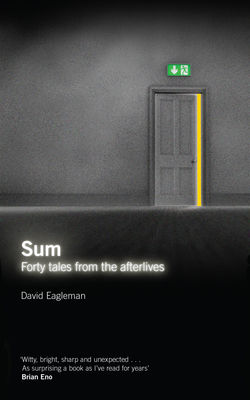Читать книгу Sum - David Eagleman - Страница 5
На сайте Литреса книга снята с продажи.
Egalitaire
ОглавлениеIn the afterlife you discover that God understands the complexities of life. She had originally submitted to peer pressure when She structured Her universe like all the other gods had, with a binary categorization of people into good and evil. But it didn’t take long for Her to realize that humans could be good in many ways and simultaneously corrupt and meanspirited in other ways. How was She to arbitrate who goes to Heaven and who to Hell? Might not it be possible, She considered, that a man could be an embezzler and still give to charitable causes? Might not a woman be an adulteress but bring pleasure and security to two men’s lives? Might not a child unwittingly divulge secrets that splinter a family? Dividing the population into two categories—good and bad—seemed like a more reasonable task when She was younger, but with experience these decisions became more difficult. She composed complex formulas to weigh hundreds of factors, and ran computer programs that rolled out long strips of paper with eternal decisions. But Her sensitivities revolted at this automation—and when the computer generated a decision She disagreed with, She took the opportunity to kick out the plug in rage. That afternoon She listened to the grievances of the dead from two warring nations. Both sides had suffered, both sides had legitimate grievances, both pled their cases earnestly. She covered Her ears and moaned in misery. She knew Her humans were multidimensional, and She could no longer live under the rigid architecture of Her youthful choices.
Not all gods suffer over this; we can consider ourselves lucky that in death we answer to a God with deep sensitivity to the byzantine hearts of Her creations.
For months She moped around Her living room in Heaven, head drooped like a bulrush, while the lines piled up. Her advisors advised Her to delegate the decision making, but She loved Her humans too much to leave them to the care of anyone else.
In a moment of desperation the thought crossed Her mind to let everyone wait on line indefinitely, letting them work it out on their own. But then a better idea struck Her generous spirit. She could afford it: She would grant everyone, every last human, a place in Heaven. After all, everyone had something good inside; it was part of the design specifications. Her new plan brought back the bounce to Her gait, returned the color to Her cheeks. She shut down the operations in Hell, fired the Devil, and brought every last human to be by Her side in Heaven. Newcomers or old-timers, nefarious or righteous: under the new system, everyone gets equal time to speak with Her. Most people find Her a little garrulous and oversolicitous, but She cannot be accused of not caring.
The most important aspect of Her new system is that everyone is treated equally. There is no longer fire for some and harp music for others. The afterlife is no longer defined by cots versus waterbeds, raw potatoes versus sushi, hot water versus champagne. Everyone is a brother to all, and for the first time an idea has been realized that never came to fruition on Earth: true equality.
The Communists are baffled and irritated, because they have finally achieved their perfect society, but only by the help of a God in whom they don’t want to believe. The meritocrats are abashed that they’re stuck for eternity in an incentiveless system with a bunch of pinkos. The conservatives have no penniless to disparage; the liberals have no downtrodden to promote.
So God sits on the edge of Her bed and weeps at night, because the only thing everyone can agree upon is that they’re all in Hell.
